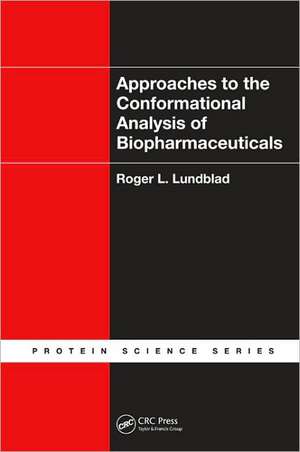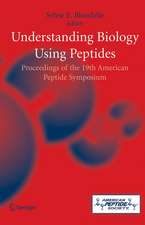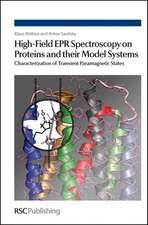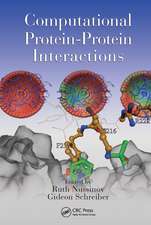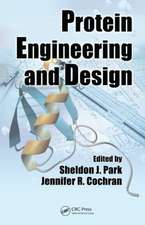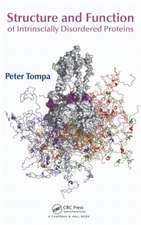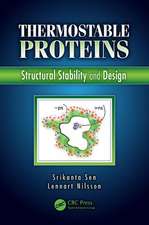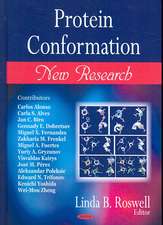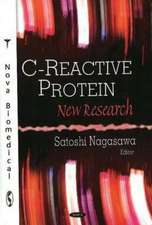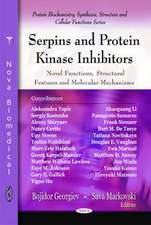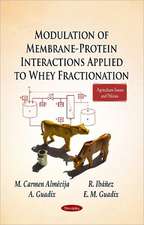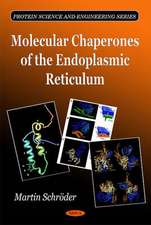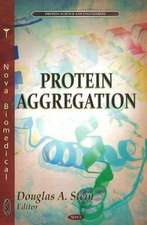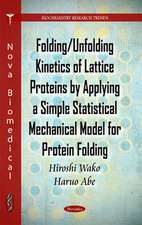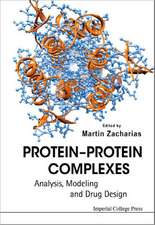Approaches to the Conformational Analysis of Biopharmaceuticals: Protein Science
Autor Roger L. Lundbladen Limba Engleză Hardback – 15 dec 2009
Explores the Growing Role of Conformational Analysis in Comparing Generic Biopharmaceuticals
Approaches to the Conformational Analysis of Biopharmaceuticals gathers the most useful techniques and methods into a single volume, putting the greatest emphasis on those approaches that have proven the most fruitful. Rather than cover specific uses of techniques in detail, this book provides commercial biotechnologists and researchers with the information and references they need to make good choices about the technology they choose to use. With a large number of references that direct readers to primary source material, it includes studies drawn from the gamut of current literature, covering physical methods, such as differential scanning calorimetry, light scanning, and analytical ultracentrifugation. It also addresses chemical methods, such as hydrogen–deuterium exchange and trace labeling, along with infrared, ultraviolet, and Raman spectroscopy.
Written by Roger Lundblad, a true pioneer in protein science, this volume supplies the necessary information researchers need to access when deciding on the most cost-effective approach, including:
- Comparability of biopharmaceuticals
- Characterization of follow-on biologics
- Quality attributes of protein biopharmaceuticals
- Confrontational analysis of biopharmaceutical products
| Toate formatele și edițiile | Preț | Express |
|---|---|---|
| Paperback (1) | 568.28 lei 6-8 săpt. | |
| CRC Press – 31 mai 2017 | 568.28 lei 6-8 săpt. | |
| Hardback (1) | 1387.80 lei 6-8 săpt. | |
| CRC Press – 15 dec 2009 | 1387.80 lei 6-8 săpt. |
Preț: 1387.80 lei
Preț vechi: 1692.43 lei
-18% Nou
Puncte Express: 2082
Preț estimativ în valută:
265.55€ • 277.26$ • 219.78£
265.55€ • 277.26$ • 219.78£
Carte tipărită la comandă
Livrare economică 05-19 aprilie
Preluare comenzi: 021 569.72.76
Specificații
ISBN-13: 9781439807804
ISBN-10: 1439807809
Pagini: 368
Ilustrații: 41 b/w images, 46 tables and about 8 equations - PPI 526
Dimensiuni: 156 x 234 x 23 mm
Greutate: 0.64 kg
Ediția:1
Editura: CRC Press
Colecția Chapman and Hall/CRC
Seria Protein Science
Locul publicării:United States
ISBN-10: 1439807809
Pagini: 368
Ilustrații: 41 b/w images, 46 tables and about 8 equations - PPI 526
Dimensiuni: 156 x 234 x 23 mm
Greutate: 0.64 kg
Ediția:1
Editura: CRC Press
Colecția Chapman and Hall/CRC
Seria Protein Science
Locul publicării:United States
Public țintă
Protein chemists, product development scientists, regulatory scientists, and pharmaceutical scientists.Cuprins
Introduction to Biopharmaceutical Conformational Analysis: Issues and Methods. Comparability of Biotechnological/Biological Products and Biological Generics. Application of Native Electrophoresis for the Study of Protein Conformation. Affinity Chromatography Including Hydrophobic Interaction Chromatography in the Study of Biopolymer Conformation. Size-Exclusion Chromatography and Biomolecular Conformation. Use of Analytical Ultracentrifugation to Study Biomolecular Conformation. Use of Differential Scanning Calorimetry to Measure Conformational Change in Proteins and Other Biomacromolecules. Light Scattering and Biomacromolecular Conformation. Use of Luminescence to Measure Conformational Change in Biopharmaceuticals with Emphasis on Protein and Protein Drug Products. Near-Infrared Spectroscopy and Macromolecular Conformation. The Use of Mid-Infrared and Fourier Transform Infrared Spectroscopy to Study Conformation of Biomacromolecules. Use of Raman Spectroscopy to Evaluate Biopharmaceutical Conformation. Use of UV-VIS Spectrophotometry for the Characterization of Biopharmaceutical Products. Use of Optical Rotatory Dispersion and Circular Dichroism to Study Therapeutic Biomacromolecule Conformation. Use of Nuclear Magnetic Resonance for the Characterization of Biotherapeutic Products. Use of Chemical Probes for the Study of Protein Conformation. Use of Hydrogen Exchange in the Study of Biopharmaceutical Conformation. Use of Chemical Modifi cation for the Conformational Analysis of Biopharmaceuticals. Use of Immunology to Characterize Biopharmaceutical Conformation. Use of Limited Proteolysis to Study the Conformation of Proteins of Biotechnology Interest. Other Technologies for the Characterization of Conformational Change in Biopharmaceuticals. Development of an Experimental Approach for the Study of the Conformation of a Biological Therapeutic Product.
Notă biografică
After postdoctoral work at Rockefeller University, New York, Dr. Roger L. Lundblad joined the faculty of the University of North Carolina at Chapel Hill in 1968. He joined the Hyland division of Baxter Healthcare in 1990. Currently, he is an independent consultant and biotechnology writer based in Chapel Hill, North Carolina. He is an adjunct professor of pathology at the University of North Carolina at Chapel Hill and an editor in chief of the Internet Journal of Genomics and Proteomics.
Recenzii
"Lundblad (pathology, U. of North Carolina at Chapel Hill) provides coverage of the range of technology used for the conformational analysis of biopharmaceutical polymers, intending to provide sufficient information and extensive references to establish the basis for the selection of a specific experimental approach that would be most cost-effective in the study of biopolymer conformation. Technologies addressed include native electrophoresis, affinity chromatography, size-exclusion chromatography, analytical ultracentrifugation, differential scanning calorimetry, light scattering, luminescence, near-infrared spectroscopy, mid-infrared and Fourier transform infrared spectroscopy, Raman spectroscopy, UV-VIS spectroscopy, optical rotatory dispersion and circular dichroism, nuclear magnetic resonance, chemical probes, hydrogen exchange, chemical modification,. immunology, and limited proteolysis"
—2010 Book News Inc., Portland, Oregon
"Without any hesitation, I recommend this book to any researcher involved in the analysis of conformation and stability of biotechnology products (not necessarily limited to biopharmaceuticals)."
—Igor A Kaltashov. Future Science
—2010 Book News Inc., Portland, Oregon
"Without any hesitation, I recommend this book to any researcher involved in the analysis of conformation and stability of biotechnology products (not necessarily limited to biopharmaceuticals)."
—Igor A Kaltashov. Future Science
Descriere
Conformational analysis is becoming more critical in the development of generic biopharmaceuticals. This book describes methods used to establish comparability between potentially identical products, providing researchers with a critical description of studies drawn from the current literature. The text covers physical methods, such as differential scanning calorimetry, light scanning, and analytical ultracentrifugation, as well as chemical methods, including hydrogen–deuterium exchange and trace labeling. The author shows how these methods support comparability claims for generic biologicals and assure structural integrity of active pharmaceutical ingredients in final drug products.
